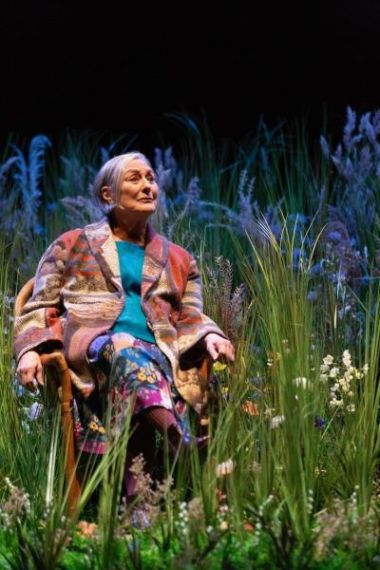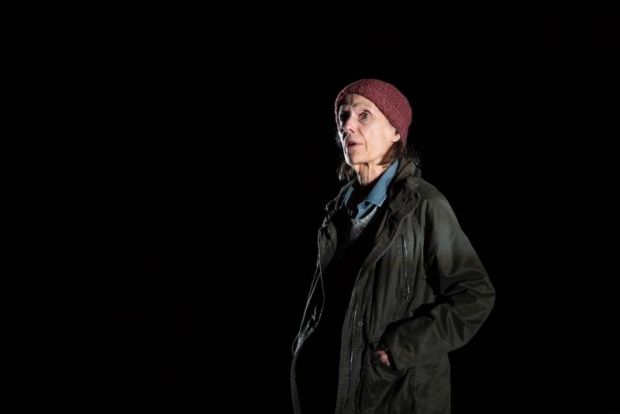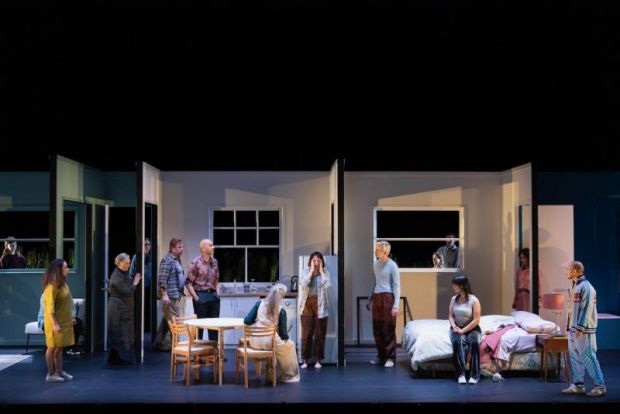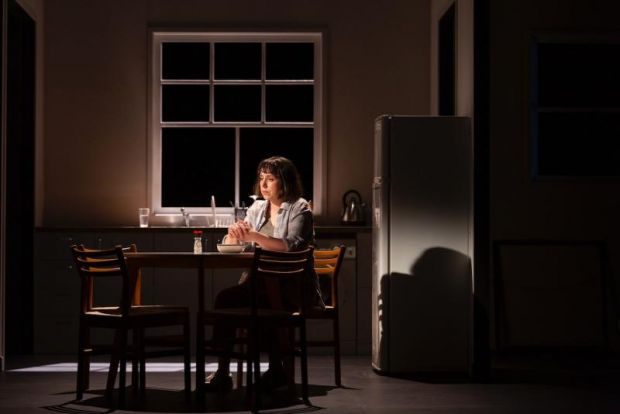Escaped Alone and What If If Only
Maybe thirty years ago, Caryl Churchill wrote that she wanted ‘plays that exposed what lay beneath ordinary life.’ And she has been writing such plays ever since.
These two plays – Escaped Alone (45 minutes) and What If If Only (25 minutes) – do just that; they are two completely separate works and yet, says director Anne-Louise Sarks, they ‘speak to each other.’ And they do. Juxtaposed, they reverberate, they illuminate each other. Both are in their own way about isolation, loneliness, and the future – or possible futures – either denied or piercingly felt. And yet – in their own way and in Caryl Churchill’s way – each is absurd, entertaining, funny, and truthful.
 In Escaped Alone, three older (the text specifies in their 70s) but lively women – Sally (Deidre Rubenstein), Vi (Debra Lawrence) and Lena (Kate Hood) in a wheelchair – on a sunny afternoon sit and chat in… well, it’s not exactly a garden. In another clever and insightful design by Marg Horwell, the women sit amongst tall, wild grasses and flowers, as if plonked down there – and the artificiality adds another layer to their talk. The collaboration between Horwell and director Anne-Louise Sarks is clearly fruitful: both get inside the text and enhance it with design.
In Escaped Alone, three older (the text specifies in their 70s) but lively women – Sally (Deidre Rubenstein), Vi (Debra Lawrence) and Lena (Kate Hood) in a wheelchair – on a sunny afternoon sit and chat in… well, it’s not exactly a garden. In another clever and insightful design by Marg Horwell, the women sit amongst tall, wild grasses and flowers, as if plonked down there – and the artificiality adds another layer to their talk. The collaboration between Horwell and director Anne-Louise Sarks is clearly fruitful: both get inside the text and enhance it with design.
A fourth woman, Mrs Jarrett (Helen Morse), evidently not of the same social class in speech or wardrobe, spies the other three. They invite her in. They know her, lives in their street, but she is and remains an outsider – not part of the shared past of the other three. Mrs Jarrett attempts valiently to contribute to the cross talk, but what she says is ignored or rarely picked up. She is, however, more than an outsider: she is a sort of Cassandra. After a total blackout, in which Sally, Vi and Lena disappear, Mrs Jarret appears downstage in cold light – and in a series of monologues, she predicts the future, that is, the end of the world in terms that are apocalyptic, horrible, weird, exaggerated, ‘poetic’, and yet strangely convincing…
The audience laughs uneasily. These monologues are, in fact, hair raising and contrast totally with the chit-chat. Another blackout and Mrs Jarrett is back with Sally, Lena and Vi as if nothing has happened… The talk resumes – until the next blackout and the next vision. The old friends reminisce, bicker, tease each other, sing an old pop song together, and bizarre secrets are revealed. The secrets are not even secrets; they seem really to disturb no one - such as Sally’s overwhelming, panic-induing terror of cats, and that Vi has been in jail for ‘accidentally murdering’ her husband - who sounds as if he deserved it. The effect of all this – which reaches no climax or resolution – is close to what Freud called the uncanny – something that is repressed (the end of the world?) but bursts into that ‘ordinary life’.

In the hands of these wonderful, so experienced actors - Hood, Rubenstein, Lawrence and Morse - this text is delivered – or so it seems to me – exactly as it should be. If any of these characters were aware of how bizarre or uncanny all this is, it would cease to be bizarre or uncanny.
In the second play, What If If Only, the very title has the ring of such woeful familiarity that all we can do is laugh ruefully. Haven’t each of us said these things, perhaps over and over. The road not taken, the missed meeting, the phone call not made, the words not spoken…
Here Marg Horwell’s design is a whole house interior that stretches right across the stage. There is perfectly ordinary furniture, but it is, at the same time, empty. Paul Jackson’s lighting sweeps across the stage then again, then again, indicating day after day after day. As a repetitious image of depression, loneliness, of absence, of bereavement, it is perfect.

A woman known only as S (the very sympathetic Alison Bell) stares out a window. With a sigh, as if forcing herself, she gets a hard-boiled egg from the fridge and eats it… drags herself to the bedroom and the unmade bed, takes off her shoes, and begins to talk… Talks to us, we think. No, she is talking to the lover who is gone… As a moment of theatre it is brilliant. What if…? If only…?
But in her loneliness – and regret and emptiness, the future - or the past future - comes to S – first as F (Lucy Ansell) infuriatingly lively and alive… and then the present P (Steve Moukakis) infuriatingly rational… and C (Teja Kingi) and then a crowd of possible futures that could, of course, could be… if only… what if… It is like the Aboriginals’ ‘fourth tense’ – past/present/future at once.

These possible futures (played by Anna Francesca Armenia, Caleb Lee, Iopu Auva’a, Sepideh Fallah, Jalen Ong, Tomas Parrish, Imogen Premraj, Aubrey Flood, Adam Geleris, Jonty Reason) fill the windows and empty spaces of S’s house. All variations on what could be, but probably won’t be, overwhelming S (perhaps in Sarks’ version here a little too much?) but dizzyingly accurate as S imagines her options and leaving her as discombobulated and rueful as she was before this visitation.
And so, in two plays, the unreal reveals the real, ‘what lies beneath ordinary life.’ These are not easy plays to grasp or to realise. Anne-Louise Sarks and her beautifully chosen cast realise them so well that we grasp them and understand them, and we are moved. Superb theatrical theatre.
Michael Brindley
Photographer: Pia Johnson
Subscribe to our E-Newsletter, buy our latest print edition or find a Performing Arts book at Book Nook.

